
8 Best Sales Management Software for 2025
Discover the top sales management software solutions for 2025. From Nektar to Salesforce, find the perfect software to drive success.
Sales management software is an effective tool designed to revolutionize your sales operations and empower your team to reach new heights of success. To effectively manage your sales team, you need to:
- Track leads
- Monitor the performance of your team
- Streamline processes
- Analyze data
There could be much more, and each challenge can make things overwhelming. Sales management solutions are specifically tailored to enhance efficiency and boost sales performance.
This article looks at the 8 best sales management software to help you get there. Each solution is carefully curated to address the unique needs of sales teams across industries. So, whether you want to drive growth or maximize revenue, let’s understand how to achieve that.

8 Sales Management Software for 2025
Now that you know the role of sales management software, let’s look at the top 8 software.
1. Nektar
2. Salesloft
3. Chorus
4. HighSpot
5. Pipedrive
6. Salesforce
7. HubSpot
8. Close
What is Sales Management Software?
Sales management software is a digital solution that streamlines and optimizes various aspects of the sales process. It is a centralized platform to help sales teams manage and automate everything from lead generation and tracking to customer relationship management (CRM).
Leveraging sales management software allows sales professionals to enhance productivity, improve collaboration, gain valuable insights, and drive revenue growth. The tool empowers users with contact management, opportunity tracking, sales forecasting, task automation, and performance monitoring, enabling them to make informed decisions.
Overview of 8 Sales Management Software for 2025
1. Nektar
Nektar is a robust sales management software with a data capture and intelligence platform specifically designed for sales leaders. Sales teams can open more doors and expand their reach by leveraging a larger pool of active contacts. The software provides valuable insights through buying group intelligence, enabling sales professionals to trigger pivotal engagements with stakeholders at the
right time.
Moreover, Nektar enhances pipeline visibility by providing real-time activity intelligence. Sales managers can stay updated on key activities and progress within the sales pipeline, allowing them to make informed decisions and take proactive actions to drive success.
Key features:
- Auto-discovered contacts from your sales tools
- Buying group intelligence to trigger engagements
- Real-time activity intelligence
- personalized coaching for remote teams
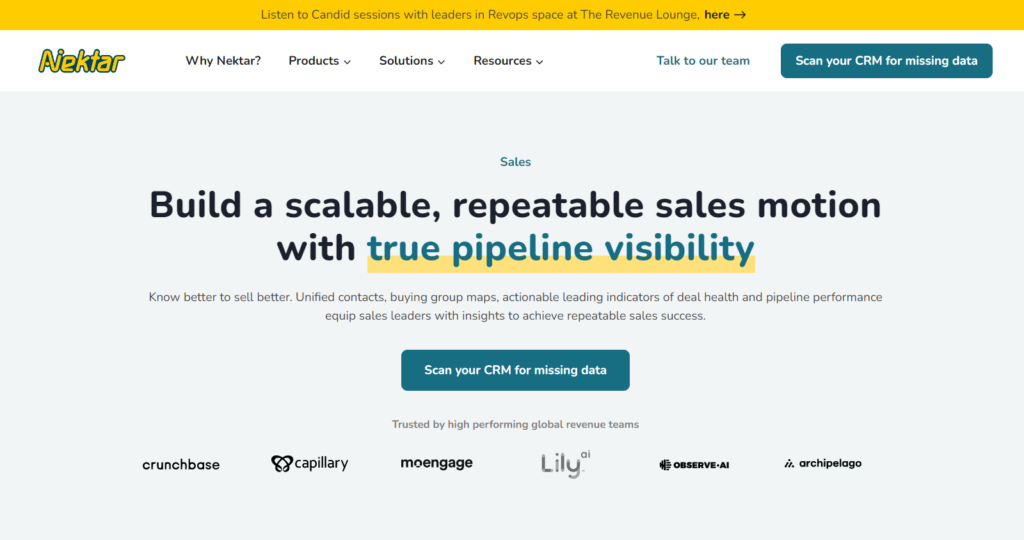
2. Salesloft
Salesloft is a sales management software that offers a comprehensive solution to streamline daily sales activities. With its automation capabilities, flexible CRM integration, and sales pipeline management features, Salesloft enables sales teams to optimize their workflows and drive efficiency.
The software provides a centralized system for managing pipeline health, prospecting workflows, customer engagement, and more. Salesloft empowers sales teams to manage their operations effectively, enhance productivity, and achieve remarkable results.
Key features:
- Automated Responses and Follow-Ups
- Scalable Coaching System
- Real-Time Reporting
- Hands-Off Scheduling
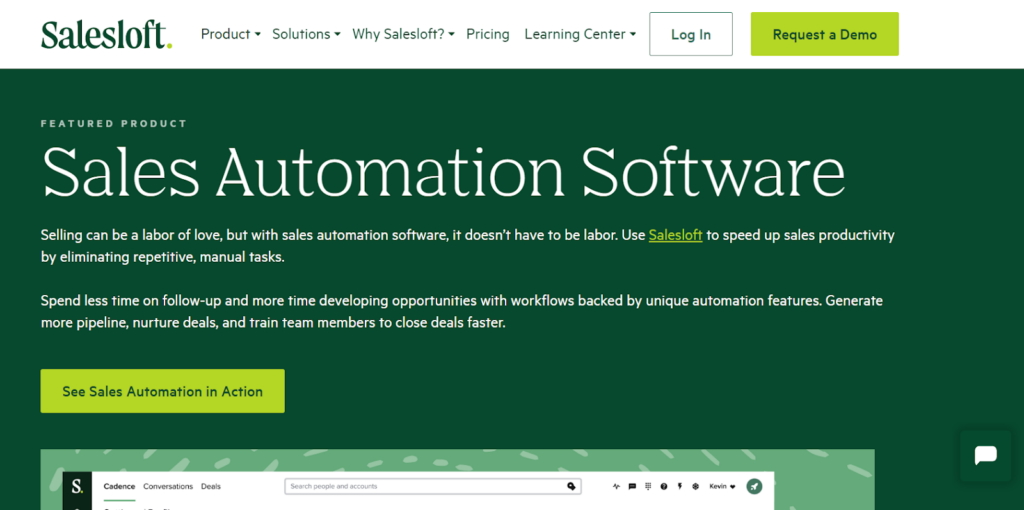
3. Chorus
Chorus offers a comprehensive solution for capturing and analyzing customer calls, meetings, and emails. The software allows you to gain deep insights into your sales process and understand why you win or lose deals. With Chorus, you can identify patterns, best practices, and areas for improvement to enhance your sales strategies.
Chorus also empowers you to forecast with confidence by leveraging its robust analytics and data-driven insights. You can unlock valuable knowledge and optimize your sales approach by harnessing the power of Chorus.
Key features:
- Sales call analysis
- Onboarding and sales enablement
- Deal intelligence & relationship management
- Market intelligence
- Connected intelligence
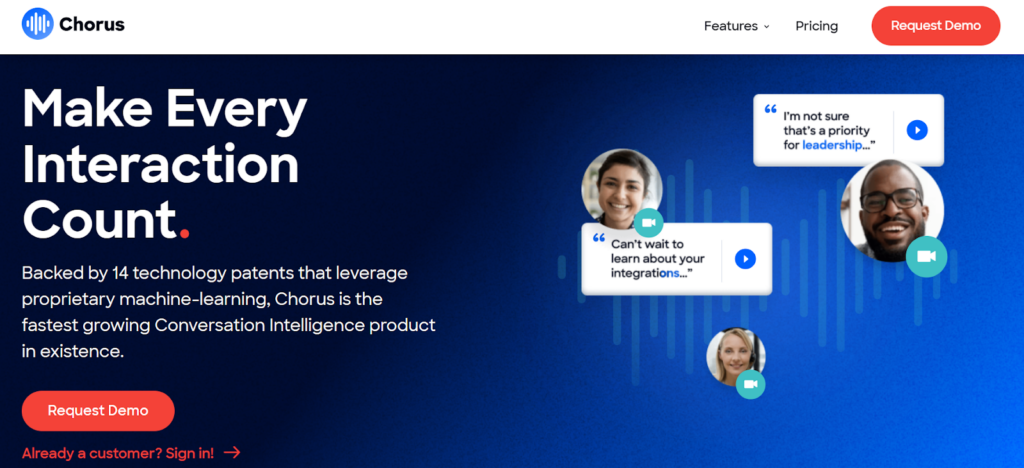
4. HighSpot
HighSpot is a comprehensive sales management software that takes customer conversations to the next level, driving strategic growth for businesses. The platform integrates intelligent content management, contextual guidance, training, and more with artificial intelligence (AI).
Sales teams can effectively manage their content, ensuring that the right information is readily available at every stage of the sales process. Additionally, HighSpot offers advanced analytics and AI capabilities that deliver valuable insights to optimize sales strategies and drive success.
Key features:
- Manage content
- Guide reps
- Engage buyers
- Train reps
- Coach reps

5. Pipedrive
Pipedrive is a sales management software designed as a light-touch sales CRM that maximizes output with minimal input. The software offers seamless data import, allowing you to populate your pipeline and make the selling process beautiful effortlessly.
With its user-friendly interface and intuitive features, Pipedrive empowers sales teams to streamline their workflows and drive results. No matter the size of your business, Pipedrive is the ideal solution to enhance your sales management and take your sales performance to new heights.
Key features:
- Set tasks and notify team members automatically
- Instantly access team and individual metrics
- Hundreds of support apps and integrations
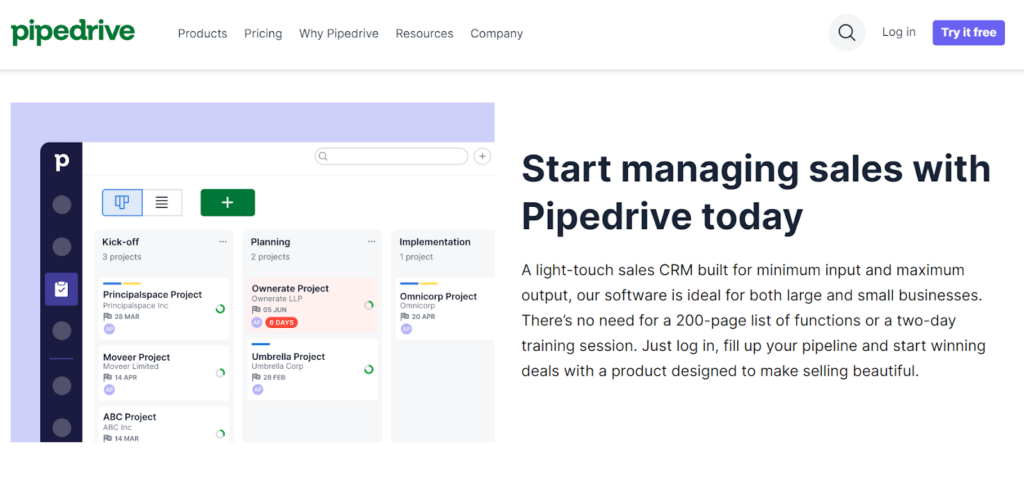
6. Salesforce
Salesforce offers a comprehensive tool suite to enhance productivity and drive growth. With built-in automation, intelligence, and real-time data, Salesforce empowers sales teams to elevate every representative and channel by providing scalable automation capabilities.
The software helps accelerate deals by providing intelligent insights, enabling sales professionals to make informed decisions and take strategic actions. Additionally, Salesforce optimizes outcomes by providing real-time data, allowing sales managers to track performance, identify trends, and make data-driven adjustments.
Key features:
- Opportunity management
- Sales automation
- Forecast management
- Revenue cloud
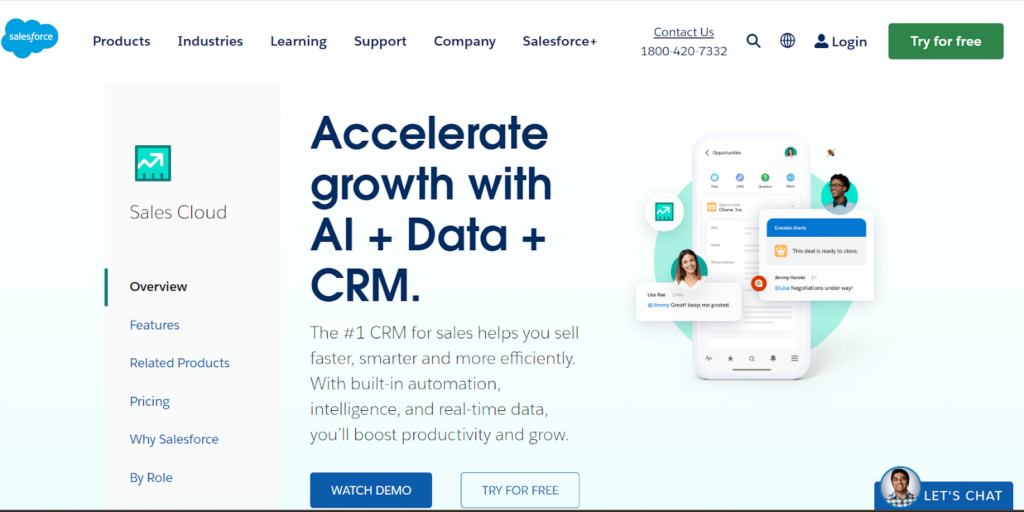
7. HubSpot
HubSpot is a dynamic sales management software that supercharges the sales process by providing a comprehensive platform for all sales tools and data. The friction of juggling multiple systems and platforms is eliminated as everything is brought together on one centralized CRM platform.
A centralized system helps streamline workflows and saves valuable time. It frees up time for sales professionals to focus on building strong relationships with their customers. HubSpot enables sales teams to sell faster and better by providing a seamless and efficient experience that enhances productivity and drives results.
Key features:
- Document management and tracking
- Conversation intelligence
- Call tracking
- Sales automation
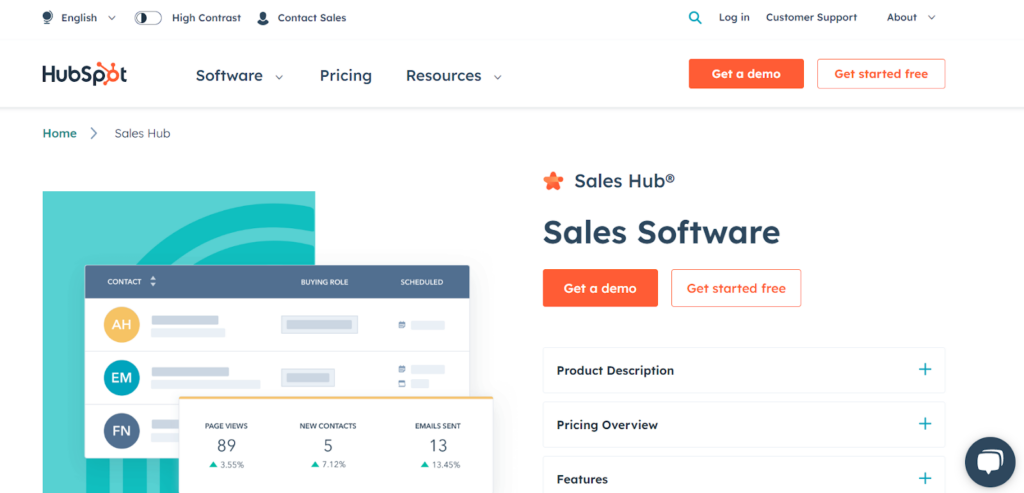
8. Close
Close is a highly efficient sales management software that allows you to onboard your team in minutes, ensuring a seamless transition and quick adoption. You can analyze workflows and key performance indicators (KPIs) to gain valuable insights into your sales process, identify areas for improvement, and make data-driven decisions.
The software’s robust analytics capabilities enable you to track sales activities and optimize strategies for maximum revenue growth. Close empowers your sales team to work smarter and close deals faster, accelerating the path to increased revenue.
Key features:
- Seamless setup and data import
- All-in-one selling through lead prioritization
- Automated outreach
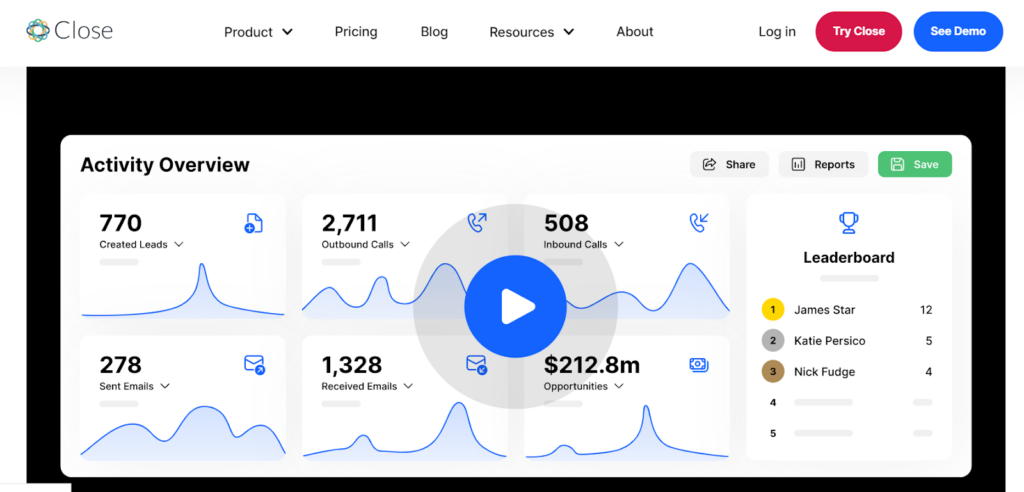
Current Challenges in Sales Management
Without sales management software, sales teams face many challenges that can hinder their performance and impede their ability to achieve optimal results. Let’s explore them in detail:
1. Disorganized data management
Sales teams often need help managing vast data scattered across spreadsheets and email threads. Data entry errors and inconsistencies can occur without a central repository or automated system. It leads to difficulty in tracking sales progress.
2. Inefficient lead management
Lead management becomes a time-consuming process when relying on traditional methods. Sales representatives may need help prioritizing and following up on leads, resulting in missed opportunities and potential revenue loss. The absence of automated lead nurturing workflows can further exacerbate inefficiencies.
3. Limited sales pipeline visibility
Without sales management software, tracking the progression of deals throughout the sales pipeline becomes a challenge. Sales managers have limited visibility into the status of individual opportunities. It becomes difficult to identify bottlenecks and forecast sales accurately. A lack of visibility can hinder proactive decision-making and strategic planning.
4. Ineffective sales collaboration
Collaboration among team members becomes cumbersome when information sharing relies heavily on manual methods. Sales representatives may struggle to access up-to-date customer information, hindering their ability to deliver personalized sales interactions. The absence of a centralized platform for collaboration limits real-time collaboration, resulting in missed opportunities for cross-selling and upselling.
5. Limited performance tracking and analysis
The lack of robust reporting and analytics capabilities makes tracking individual and team performance challenging. Sales managers may find it challenging to monitor KPIs and assess the effectiveness of sales strategies. It further hampers the ability to make data-driven decisions and implement targeted coaching initiatives.
Types of Sales Management Activities
Sales management activities encompass several crucial tasks essential for driving sales success and achieving organizational goals. Let’s take a look at key sales management activities:
1. Sales planning
Sales planning involves setting objectives, defining sales strategies, and creating a roadmap for achieving targets. It includes analyzing market trends, identifying target customer segments, and developing sales forecasts and budgets.
2. Lead generation and qualification
Generating quality leads is crucial for a thriving sales pipeline. Sales managers are responsible for implementing lead generation strategies, leveraging marketing initiatives, and ensuring leads are effectively qualified and prioritized for the sales team.
3. Sales team management
It involves recruiting and training the sales team members. Sales managers provide guidance and mentorship support to help their team members excel. 32% of a sales manager’s time goes into managing people, highlighting the importance of automation.
4. Sales process optimization
Sales managers analyze and refine the sales process to maximize efficiency and effectiveness. They identify bottlenecks, streamline workflows, and implement sales methodologies and best practices to improve conversion rates and shorten sales cycles.
5. Customer relationship management (CRM)
Sales managers oversee the implementation and utilization of CRM to manage customer interactions, sales activities, and pipeline progression. They need to ensure accurate data entry and leverage the system to gain insights for strategic decision-making.
6. Sales forecasting and reporting
Forecasting and reporting are about collecting and analyzing data to predict future sales trends. The activity also helps with regular reports on sales performance, revenue projections, and key performance indicators (KPIs).
7. Sales coaching and training
Sales managers provide coaching and skill development opportunities to enhance the capabilities of individual sales representatives, enabling them to excel in their roles. Effective collaboration among sales teams can lead to a 41% increase in account growth possibilities, making it a must-do activity.
Advantages of Sales Management Software
Here are some key ways in which sales management software helps streamline and optimize the sales process:
1. Centralized data management
Sales management software is a centralized hub for storing and managing customer information, contact details, and interaction history. It eliminates disparate systems and manual data entry, which ensures consistent data and accessibility.
2. Efficient lead management
The software automates lead capturing, tracking, and nurturing processes. It enables the systematic organization and prioritization of leads. Your team can benefit from prompt follow-ups, personalized communications, and seamless lead progression through the sales pipeline.
3. Enhanced sales pipeline visibility
With sales management software, getting real-time visibility into the sales pipeline becomes a breeze. Sales managers can track the progress of deals and allocate resources effectively. The visibility enables proactive decision-making and the timely adjustment of strategies to optimize sales performance.
4. Streamlined collaboration and communication
Teams can collaborate and communicate effectively within a single platform. It facilitates sharing of customer insights, sales collateral, and updates, enabling better alignment among team members. Improved collaboration enhances teamwork and knowledge sharing.
5. Performance tracking and analytics
The robust reporting and analytics capabilities empower sales managers to track individual and team performance against KPIs. Detailed sales reports and analytics provide valuable insights into sales trends and facilitate data-driven decision-making.
6. Automation of routine tasks
Sales management software automates data entry, lead assignment, and follow-up reminders. It frees up sales representatives’ time, allowing them to focus on building relationships and providing personalized customer experiences. Automation improves productivity and enhances efficiency throughout the sales process.
Get Started With Nektar to Boost your Sales Management Activities
With Nektar, you gain full visibility into your sales processes, from lead to cash.
The software allows you to capture data that might be buried in siloed systems and bring it directly into your CRM, ensuring a centralized and comprehensive view of your sales operations. Nektar also enables you to enrich and update the data, ensuring its accuracy and relevance.
Upgrade your sales management today by getting started with Nektar and unlock the potential for growth and excellence in your sales operations. Contact us today to see Nektar in action.
FAQs
- What are the 4 types of sales management?
The four types of sales management are strategic sales management, operational sales management, analytical sales management, and motivational sales management. Each type focuses on different aspects of sales leadership and plays a crucial role in driving sales success.
- What software does the sales department use?
The sales department typically uses sales management software, customer relationship management (CRM) software, and other specialized sales tools. These software solutions help streamline sales processes, manage customer interactions, track leads, monitor performance, and improve overall sales effectiveness.
- What is a CRM software?
CRM software is a technology platform that helps businesses manage their relationships and interactions with customers. It provides a centralized database to store customer information, track sales activities, manage leads, and automate tasks.
- What are CRM tools?
CRM tools are software applications or features within a CRM system that enable businesses to manage customer relationships effectively. These tools include contact management, lead and opportunity management, sales forecasting, and more.
PUBLISHED BY






